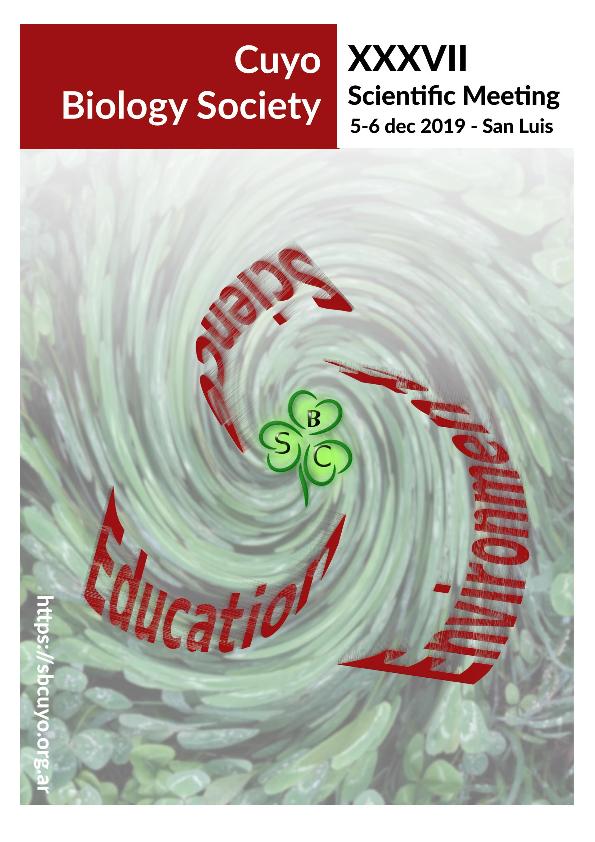Mostrar el registro sencillo del ítem
dc.contributor.author
Gomez, Jessica Daniela

dc.contributor.author
Guarise, C.
dc.contributor.author
Cifuente, Diego Alberto

dc.contributor.author
Sosa, Claudia Marcela

dc.contributor.author
Barrera, Patricia Andrea

dc.date.available
2023-10-25T19:38:07Z
dc.date.issued
2019
dc.identifier.citation
A semi-synthetic molecule derived from dehydroleucodine affects the trypanosoma cruzi cell cycle; XXXVII Reunión Científica Anual de la Sociedad de Biología de Cuyo; San Luis; Argentina; 2019; 14-14
dc.identifier.issn
0327-9545
dc.identifier.uri
http://hdl.handle.net/11336/215984
dc.description.abstract
Trypanosoma cruzi is a parasite causing Chagas disease, which is endemic in Latin America, but in the last 20 years, it has expanded worldwide. The current treatment is restricted to Nifurtimox and Benznidazole, but both are relatively toxic and have limited efficacy on the patients. The development of new effective therapeutic agents is urgently needed. The sesquiterpene lactones (STLs) are natural compounds purified from native plants of Argentina with multiple pharmacological applications. The STL dehydroleucodine (DhL), has an alpha-methylene group that could react with multiple sulfhydryl group-containing proteins, affecting cellular functions such as proliferation, the activity mitochondrial, leading to the cell death/apoptosis. This study is focused on elucidating the action mechanisms of DhL and its derivative DC-X11, obtained by chemical substitution, on T. cruzi epimastigotes (strain Dm28c). We observed that DhL and DC-X11 have antiproliferative and cytostatic effects on the parasites. By morphological and ultrastructural studies, we observed an increase of parasites with multiple cell nuclei, kinetoplasts, or flagella after the treatment with DC-X11, suggesting an effect on late steps of the cell cycle (i.e., cellular division). These results were confirmed with parasites synchronized with hydroxyurea (HU 20 mM) for 24 h, and then they were treated with the compound. We concluded that the derivative DC-X11 inhibits T. cruzi proliferation by delaying the progression of the cell division. Further studies are necessary to identify the molecular targets affected by DC-X11.
dc.format
application/pdf
dc.language.iso
eng
dc.publisher
Tech Science Press

dc.rights
info:eu-repo/semantics/openAccess
dc.rights.uri
https://creativecommons.org/licenses/by-nc-sa/2.5/ar/
dc.subject
TRYPANOSOMA CRUZI
dc.subject
CELL CYCLE
dc.subject
SEMI-SYNTHETIC MOLECULE
dc.subject.classification
Biología Celular, Microbiología

dc.subject.classification
Ciencias Biológicas

dc.subject.classification
CIENCIAS NATURALES Y EXACTAS

dc.title
A semi-synthetic molecule derived from dehydroleucodine affects the trypanosoma cruzi cell cycle
dc.type
info:eu-repo/semantics/publishedVersion
dc.type
info:eu-repo/semantics/conferenceObject
dc.type
info:ar-repo/semantics/documento de conferencia
dc.date.updated
2023-02-23T14:00:42Z
dc.journal.volume
44
dc.journal.number
Suppl. 1
dc.journal.pagination
14-14
dc.journal.pais
Estados Unidos

dc.journal.ciudad
Nevada
dc.description.fil
Fil: Gomez, Jessica Daniela. Consejo Nacional de Investigaciones Científicas y Técnicas. Centro Científico Tecnológico Conicet - Mendoza. Instituto Histología y Embriología D/mend Dr.m.burgos; Argentina. Universidad Nacional de Cuyo. Facultad de Ciencias Médicas; Argentina
dc.description.fil
Fil: Guarise, C.. Consejo Nacional de Investigaciones Científicas y Técnicas. Centro Científico Tecnológico Conicet - San Luis. Instituto de Investigaciones en Tecnología Química. Universidad Nacional de San Luis. Facultad de Química, Bioquímica y Farmacia. Instituto de Investigaciones en Tecnología Química; Argentina
dc.description.fil
Fil: Cifuente, Diego Alberto. Consejo Nacional de Investigaciones Científicas y Técnicas. Centro Científico Tecnológico Conicet - San Luis. Instituto de Investigaciones en Tecnología Química. Universidad Nacional de San Luis. Facultad de Química, Bioquímica y Farmacia. Instituto de Investigaciones en Tecnología Química; Argentina
dc.description.fil
Fil: Sosa, Claudia Marcela. Consejo Nacional de Investigaciones Científicas y Técnicas. Centro Científico Tecnológico Conicet - Mendoza. Instituto Histología y Embriología D/mend Dr.m.burgos; Argentina. Universidad Nacional de Cuyo. Facultad de Ciencias Médicas; Argentina
dc.description.fil
Fil: Barrera, Patricia Andrea. Consejo Nacional de Investigaciones Científicas y Técnicas. Centro Científico Tecnológico Conicet - Mendoza. Instituto Histología y Embriología D/mend Dr.m.burgos; Argentina. Universidad Nacional de Cuyo. Facultad de Ciencias Médicas; Argentina
dc.relation.alternativeid
info:eu-repo/semantics/altIdentifier/url/https://sbcuyo.org.ar/wp-content/uploads/2019/12/Libro-BIOCELL-2019.pdf
dc.conicet.rol
Autor

dc.conicet.rol
Autor

dc.conicet.rol
Autor

dc.conicet.rol
Autor

dc.conicet.rol
Autor

dc.coverage
Nacional
dc.type.subtype
Congreso
dc.description.nombreEvento
XXXVII Reunión Científica Anual de la Sociedad de Biología de Cuyo
dc.date.evento
2019-12-05
dc.description.ciudadEvento
San Luis
dc.description.paisEvento
Argentina

dc.type.publicacion
Journal
dc.description.institucionOrganizadora
Sociedad Biología de Cuyo
dc.source.revista
Biocell

dc.date.eventoHasta
2019-12-06
dc.type
Congreso
Archivos asociados
